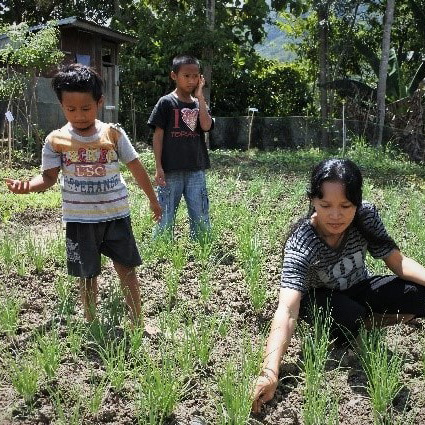Stories of Change

Elsi and her sons in the Laraswati group garden, where group members grow crops to feed their families and sell for extra income.
“I didn’t want to sit by and wait for the next disaster”
Landslides are a significant hazard in the Tana Toraja region of South Sulawesi, Indonesia. They are a particularly dangerous threat in the village of Rano, which is in a valley. Rano has hotter temperatures than neighboring communities. That means droughts are harsher here, when it doesn’t rain for long periods. When the rains come, they can trigger dangerous landslides.
In late 2016, deadly landslides hit Rano and devastated the village. Elsi Bura Tasik’s family was harmed in those landslides. CWS responded immediately alongside a local partner to help families cope.
“I didn’t want to sit by and wait for the next disaster [to devastate us again],” Elsi says. That’s why she’s now a community leader within the CWS DREAM program, which focuses on emergency preparedness and building long-term resilience. As soon as she could after the 2016 landslides, Elsi decided to learn more about what she could do to protect her family and neighbors. And in the years since, she has worked hard to help DREAM succeed in Rano.
Recently, Elsi has become a leader in the Larasati Savings and Loan group. Groups like this one, which CWS supports in the DREAM program and across our programs in Asia, enable neighbors to save together and take out loans (at a modest interest rate) to start businesses, grow existing businesses or get through periods of scarcity. Elsi has been a driving factor in the group’s amazing success; in just one year, the group’s capital has reached 3,000,000 Rupiah–about $200. That’s about four months of income for a family here. “All of the women in the group inspire and lift each up each other,” Elsi says.
How does a savings group like this one lead to disaster resilience? They build economic stability and resilience, which are critical to coping with a disaster. Financially secure families can afford to repair or replace lost or damaged items after a disaster, and families with diversified income streams are more likely to continue to have livelihoods after disaster strikes. That’s why these groups focus on working with women to start or expand businesses to supplement their husbands’ farm labor income.
